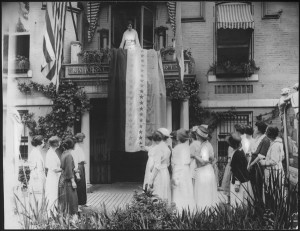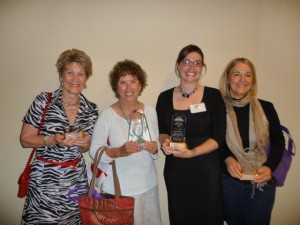This isn’t about writing at all, except that I’m writing about it. It’s about luck and a lot of other things. Sometime in August I decided that, although I never play the lottery, I wanted to see if using nothing but “lucky pennies” might make a “lucky dollar” and get me a winning ticket. During the summers I run most days along a pretty heavily touristed stretch and when school starts I have a brisk twenty-five minute walk each way through downtown San Diego, so I have plenty of opportunity to scan sidewalks. I started picking up pennies and the occasional nickel or dime, and I am now up to fifty cents.
The project seems so silly that I am surprised at how much pleasure it has given me. Today I found two pennies on my walk to school, and I was so excited I sent a text message to my partner. But as I walked on, I started thinking about something that happened during the summer, when I was running along a grass easement in front of the Convention Center. It was already a good day—about ten minutes into my hour-long run I found a dime in a crosswalk used by conventioneers to get to the Gaslamp District. That will put a spring in the step!
Not more than a minute or two later, I saw a glint in the grass and saw two quarters. Two quarters! The dime had brought me up to twenty-seven cents at that point, and suddenly I was more than seventy-five percent of the way to my dollar. I was astonished!
As I ran along, I started thinking about the fifty cents. It was on a stretch where a few homeless men sack out during the day, and it must have fallen out of someone’s pocket. The rest of the run I pondered a lot of things—starting with how much more important it was to him that he had lost the money than it was to me that I had found it. I started thinking about my desire to get lucky and I realized how it was hard to get much luckier than I already was.
I decided not to keep the fifty cents but to give it to another homeless person. A tattered, sunburned woman always sitting on a retaining wall near the end of my run and calls out “have a good run!” every time I pass by. If she was there that day, I would give the money to her.
The rest of the run I was happier about the fifty cents than I was when i first spotted it. I felt more of a connection to the nameless, faceless soul who patted his pockets and knew the buying power of that money had drained from his life. I thought about how it would make some small difference in the day of the woman I was running toward. But mostly I thought about the Jewish concept of a mitzvah, which is sometimes translated as “good deed” but is so much more than that.
A mitzvah is when we do something in keeping with God’s intentions for our behavior. Take God out of the equation, and the meaning doesn’t really change that much. The world isn’t fair, and that’s not right. It’s up to each of us to do what we can to bring a little more balance, a little more equity, into it. Call it dharma, call it words carved by divine lightning onto stone tablets on a mountain in the desert–it doesn’t matter. I couldn’t keep the money because it made the world even more imbalanced than it already was.
As I transported the coins from their old owner to their new one, I didn’t really think of it as a good deed, but about my membership in something bigger. “Have a nice run!”the woman called out as I strode to a stop.
“I found two quarters back there,” I said with a grin. “I think they belong to you.”
She jumped up and hugged me, despite the sweat. “Thank you so much!” she said, almost dancing.
Her name was Kelly. I never thought to ask before.
What happened to the dime? Reader, it’s in the pile on my desk. Finders keepers!
Maybe there’s a blessing now on my quest for a dollar’s worth of lucky change, but I don’t care. It’s a game I’ve already won.


